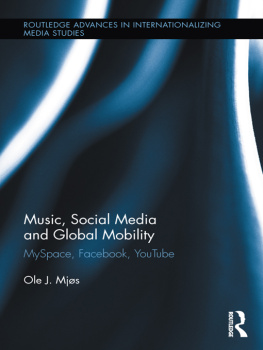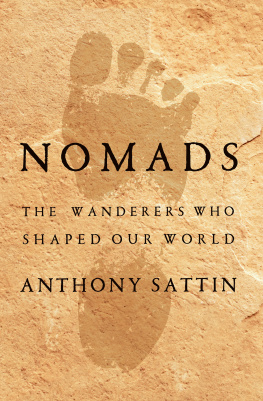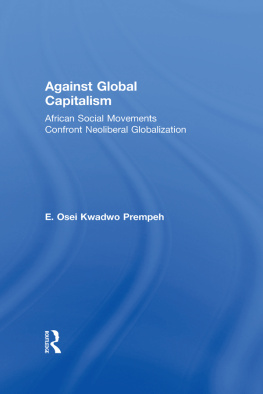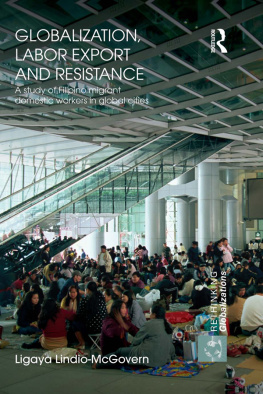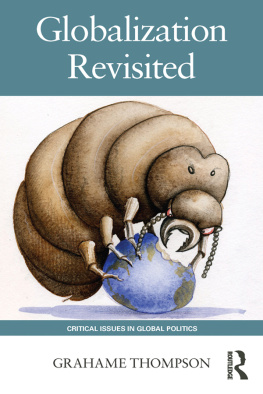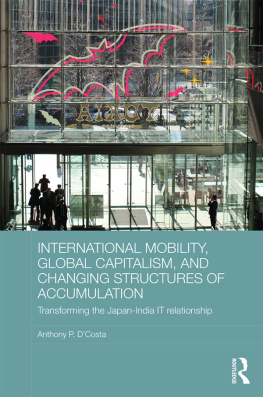
Global Nomads
A uniquely nomadic ethnography, Global Nomads is the first in-depth treatment of a counterculture flourishing in the global gulf stream of new electronic and spiritual developments. DAndreas is an insightful study of expressive individualism manifested in and through key cosmopolitan sites. This book is an invaluable contribution to the anthropology/sociology of contemporary culture, and presents required reading for students and scholars of new spiritualities, techno-dance culture and globalization.
Graham St John, Research Fellow, School of American Research, New Mexico
DAndrea breaks new ground in the scholarship on both globalization and the shaping of subjectivities. And he does so spectacularly, both through his focus on neomadic cultures and a novel theorization. This is a deeply erudite book and it is a lot of fun.
Saskia Sassen, Ralph Lewis Professor of Sociology at the University of Chicago, and Centennial Visiting Professor at the London School of Economics.
Global Nomads is a unique introduction to the globalization of countercultures, a topic largely unknown in and outside academia. Anthony DAndrea examines the social life of mobile expatriates who live within a global circuit of counter-cultural practice in paradoxical paradises.
Based on nomadic fieldwork across Spain and India, the study analyzes how and why these post-metropolitan subjects reject the homeland to shape an alternative lifestyle. They become artists, therapists, exotic traders and bohemian workers seeking to integrate labor, mobility and spirituality within a cosmopolitan culture of expressive individualism. These countercultural formations, however, unfold under neo-liberal regimes that appropriate utopian spaces, practices and imaginaries as commodities for tourism, entertainment and media consumption.
In order to understand the paradoxical globalization of countercultures, Global Nomads develops a dialogue between global and critical studies by introducing the concept of neo-nomadism which seeks to overcome some of the shortcomings in studies of globalization.
This book is essential reading for undergraduate, postgraduate and research students of Sociology, Anthropology of Globalization, Cultural Studies and Tourism.
Anthony Albert Fischer DAndrea has recently earned a PhD in Anthropology at the University of Chicago, where he is Research Associate at the Transnationalism Project.
Global Nomads
Techno and New Age as transnational countercultures in Ibiza and Goa
Anthony DAndrea
First published 2007
by Routledge
2 Park Square, Milton Park, Abingdon, Oxon, OX14 4RN
Simultaneously published in the USA and Canada
by Routledge
270 Madison Ave, New York, NY 10016
Routledge is an imprint of the Taylor & Francis Group, an informa business
2007 Anthony DAndrea
This edition published in the Taylor & Francis e-Library, 2006.
To purchase your own copy of this or any of Taylor & Francis or Routledges collection of thousands of eBooks please go to www.eBookstore.tandf.co.uk.
All rights reserved. No part of this book may be reprinted or reproduced or utilized in any form or by any electronic, mechanical, or other means, now known or hereafter invented, including photocopying and recording, or in any information storage or retrieval system, without permission in writing from the publishers.
British Library Cataloguing in Publication Data
A catalogue record for this book is available from the British Library
Library of Congress Cataloging in Publication Data
A catalog record for this book has been requested
ISBN 0-203-96265-6 Master e-book ISBN
ISBN10: 041542013X (hbk)
ISBN10: 0203962656 (ebk)
ISBN13: 9780415420136 (hbk)
ISBN13: 9780203962657 (ebk)
Contents
The club scene: underground and industry
Figures
Acknowledgments
This book is based on a doctoral research conducted over the course of several years, places and multidisciplinary incursions. I would like to thank Elizabeth Povinelli, Saskia Sassen, Joe Masco, Kesha Fikes, Tanya Luhrmann, Arnold Davidson and Arjun Appadurai for their advice at former and latter stages of my education at the Department of Anthropology at the University of Chicago.
From the field, I am grateful to Gary Blanford, Kirk Huffman, Ronnie Randall and Nora Belton for their contribution to the development of this project. I also thank Georgia Taglietti, William Crichton, Antonio Nogueira, Roberta Jurado, Peter Hankinson, Tirry and Toni for their generous support to my fieldwork in the club scene of Ibiza. In India, I wish to thank Swami Prasado and Boyan Artac, as well as Dilip Loundo and Alito Siqueira for interactions at Goa University.
I am also grateful to other friends and colleagues, in particular to Graham St John and Adam Leeds, who have read parts of my manuscript and made important comments. I also appreciate the kind permission of Ronnie and Stephen Randall, Ekki Gurlitt and Krishnananda Trobe to use photos and an extended quote. Finally, I thank John Urry for allowing that my work be available in book form.
This research was indirectly funded with a CAPES Foundation fellowship to conduct my doctoral studies at Chicago. I also thank the Center for Latin American and Iberian Studies and the Gay and Lesbian Studies Project, both at the University of Chicago, for sponsoring segments of my fieldwork with travel grants.
While grateful to the sedentary dwellers of Goa, Pune, Ibiza and Chicago, I wish to dedicate this book to global nomads expressive expatriates, New Agers and Techno freaks who enabled me to learn something about their lines of flight.
Anthony Fischer DAndrea
Chicago, January 2007
1 Neo-nomadism
A theory of postidentitarian mobility in the global age
The nomad does not move.
Deleuze and Guattari, A Thousand Plateaus
Global nomads: instance of cultural hypermobility
Ibiza island (Spanish Mediterranean), summer 1998 We left Caf del Mar in the busy touristy town of Sant Antoni, and drove north toward a secluded lighthouse where a Goa trance party was scheduled to happen. Goa trance is a potent subgenre of electronic dance music developed by Western neo-hippies (freaks) on the beaches of Goa state (India) in the early 1990s. My companions that night were four UK and US expatriates who resided in Ibiza or visited the island regularly: two yoga teachers, a jewelry trader and a journalist, women in their thirties and forties, wearing light hippie, gypsy-like clothes and a crystal dot on the forehead. An Italian party promoter had told us about the event. The police busted his own party a week before, because of the vested interests of big business: club and bar owners. In Ibiza, Goa and elsewhere, trance parties are usually illegal, being secretively announced through word-of-mouth across the alternative populace that, at various levels and degrees, embraces free open-air tribal parties in secluded, natural settings.
In a confusing maze of precarious dirt roads, we joined a caravan of lost drivers and, having noticed several vehicles suspiciously parked amid dry vegetation, we decided to stop. The night was absolutely dark. Thin flashlights and the eerie stomping of techno music afar were our only leads as we blindly stumbled toward the venue. By the cliff edge, the lighthouse projected three solid light beams of mesmerizing beauty. Beside it, a camp formation with a few tents and banners was dimly lit in fluorescent purple. UV lights produced a phantasmagoric glow on colorful fractal drapes, white clothes, teeth and eyes. A delicate scent of incense pervaded the air, blending with the acrid smell of hashish smoking. A crowd danced in front of the DJ (disc jockey) tent located between thundering loudspeakers, while many others scattered around.


